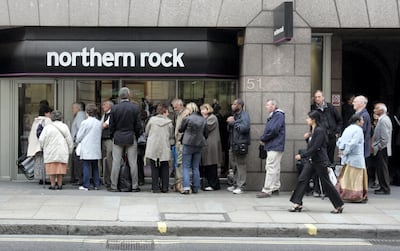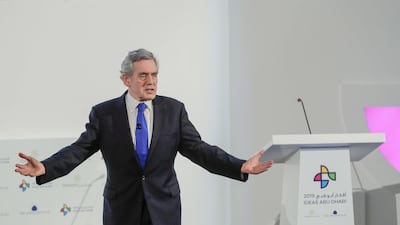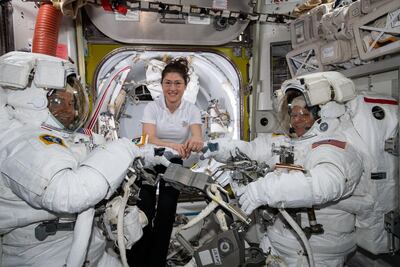Global leaders should look to the skies to find inspiration to put differences with rivals aside, a former UK Prime Minister has said.
Gordon Brown, who led the UK between 2007 and 2010 and was widely seen as playing a major role in averting the collapse of the global financial system, said the International Space Station showed what could be achieved through cross-border cooperation.
Speaking at New York University Abu Dhabi, which is hosting Ideas Abu Dhabi, he called for reforms to the World Bank, so that it would be better at helping relieve poverty and delivering humanitarian aid, and an overhaul to the G20 of leading nations to make it more inclusive to non-members.
UN environmental bodies should also be “given teeth” to help them enforce targets, as well as set them.
"The one thing that has really made me think about this is looking upwards at the International Space Station," said Mr Brown, 68, who is now a UN Special Envoy on Global Education, adding that the UAE's space ambitions and their first astronaut's first mission, planned for September, is a "great achievement... in such a short period of time".
“But for 30 years, Russia and America fought each other, the space wars to get to the moon. Bitter, internecine and intense. Then in the 1980s and 1990s they realised that the only way they could make progress in space was to work together, hence the International Space Station, hence 20 or so countries involved in sending astronauts up to the space station.
“It’s so interdependent on each country working together, that America now cannot do the launch to the space station without Russian technology, and Russia cannot man the space station without American technology.”
He added: “I say, if we can achieve [cooperation] in the most volatile area of previous years and in the most sensitive area of space… then surely we can find better ways of cooperating here on Earth.”
Mr Brown did not mention Brexit in a 20-minute speech, other than remarking that he saw it as “a good example of protectionism and reaction to populism”, in the same week that a political crisis over his country's departure from the UK deepens in London.

He did reflect on the 2008-9 financial crisis, which took place when he was in power. Mr Brown was seen as a leading figure in helping avert a total collapse of the world financial system, by persuading countries including America to work together to take coordinated action in areas such as interest rates and financial stimulus packages.
However, he said that if a similar situation was to occur now, he believed the world would descend into acrimony rather than putting differences aside to avoid a greater disaster.
“None of the things in my view would be available to us if there was a crisis tomorrow,” he said. “The fact we have gone backwards on cooperation in such a way that I doubt there would be scope for much fiscal cooperation.
“China will certainly not inject the sort of money they did before and ask why should they bail out Europe or America.
“More likely, instead of cooperating with each other, countries will just blame each other for what’s gone wrong. So China will blames America, America blames China, Europe blames everybody else and then other countries have got to suffer along with it. So it does illustrate this problem.
“This is a real immediate problem because if there was a downturn tomorrow we do know it is likely to last longer because the absence of cooperation.”


